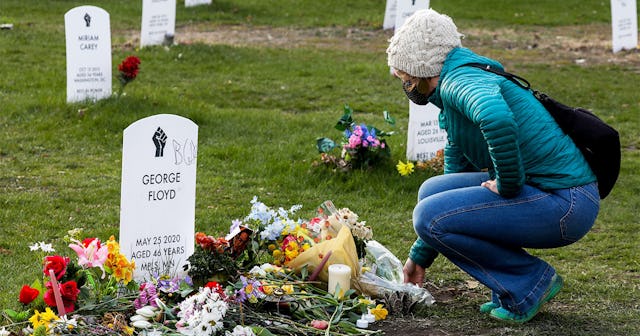‘Say Their Names’ Memorial Honors Black Lives Lost To Police Violence

The memorial was created last summer after the death of George Floyd and now, people are flocking to pay tribute after Derek Chauvin’s guilty verdict
On May 25, 2020 46-year-old George Floyd, an unarmed Black man, was killed by a white Minneapolis police officer named Derek Chauvin — a tragedy that has sparked global outrage over systemic racism, with a heavy focus on deadly discrimination by law enforcement. Hoping to further that conversation in a visual (and visceral) way, University of Pennsylvania graduates Anna Barber and Connor Wright traveled to Minnesota to create the “Say Their Names” cemetery installation.
Now, visitors are flocking to the memorial after Derek Chauvin was found guilty on all counts in Floyd’s murder earlier this week.
Yasin Ozturk/Anadolu Agency/Getty
Featuring row after row of white boards cut into the shape of tombstones, the poignant art bears the names of 100 Black Americans who’ve died due to police brutality. Each “tombstone” also features three stirring words: “Rest in power.” At the front of the cemetery, a marker implores passersby to consider how insufficient the scope of the installation really is. “How many have there been? How many more must there be?” it reads.
The memorial’s heartbreaking nature is weighted further by the fact it sits just off of Minneapolis’ 37th street — mere blocks away from the spot where Chauvin knelt on Floyd’s neck for nearly nine minutes, suffocating him. According to Barber and Wright, they simply want the memorial to “speak for itself.”
Yasin Ozturk/Anadolu Agency/Getty
Speaking to St. Paul’s KSTP, visitor David Smith pointed to the power of seeing the cemetery in person. “Hopefully, this is a wake-up call between what we’ve been seeing around the city, around the country, and the world,” Smith said.
He continued, “It’s not a physical representation in the flesh, but now that you can put a name to a marker and see, ‘Oh wow.’ Hopefully, it turns the light bulb on for people to start paying attention, and figuring out, ‘What can I do as a citizen?’ No matter what my race is, no matter your socioeconomic status. ‘What can I do to make things better?’”
Yasin Ozturk/Anadolu Agency/Getty
One inarguable fact since Floyd’s death is that people around the world have been compelled to act. Every U.S. state and 18 countries reportedly mobilized in protest in the wake of his death. Public figures are calling for sweeping reform to address systemic racism. And not only has Chavin (along with the other police officers involved) been arrested and charged in Floyd’s murder, but the state of Minnesota has announced some appropriately drastic policy changes, too.
Yasin Ozturk/Anadolu Agency/Getty
Last summer, the majority of Minneapolis city council members voted to defund and dismantle the city’s police department in favor of “a new model of public safety.” And now, the city is under DOJ investigation into possible patterns of use of excessive force and racial discrimination.
This article was originally published on